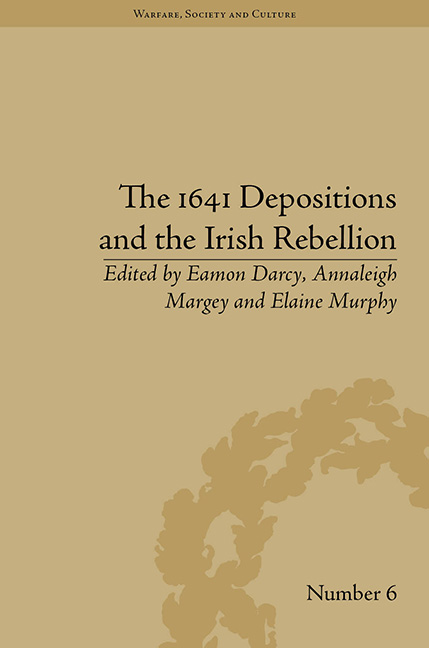Book contents
- Frontmatter
- CONTENTS
- Dedication
- Acknowledgements
- List of Contributors
- List of Figures and Tables
- List of Abbreviations
- Preface
- Introduction
- Part I The Outbreak of the Rebellion
- 1 Owen Connolly, Hugh Og MacMachon and the 1641 Rebellion in Clogher
- 2 What do the Depositions say about the Outbreak of the 1641 Rising?
- 3 Mapping the Outbreak of the Rebellion: Robberies in County Cavan (October 1641)
- 4 Mount Taragh's Triumph: Commitment and Organization in the Early Stages of the 1641 Rebellion in Meath
- Part II Social Aspects of the Rebellion
- Part III Political and Military Aspects of the Rebellion
- Conclusion: The Rebellion in Text and Context
- Notes
- Index
3 - Mapping the Outbreak of the Rebellion: Robberies in County Cavan (October 1641)
from Part I - The Outbreak of the Rebellion
- Frontmatter
- CONTENTS
- Dedication
- Acknowledgements
- List of Contributors
- List of Figures and Tables
- List of Abbreviations
- Preface
- Introduction
- Part I The Outbreak of the Rebellion
- 1 Owen Connolly, Hugh Og MacMachon and the 1641 Rebellion in Clogher
- 2 What do the Depositions say about the Outbreak of the 1641 Rising?
- 3 Mapping the Outbreak of the Rebellion: Robberies in County Cavan (October 1641)
- 4 Mount Taragh's Triumph: Commitment and Organization in the Early Stages of the 1641 Rebellion in Meath
- Part II Social Aspects of the Rebellion
- Part III Political and Military Aspects of the Rebellion
- Conclusion: The Rebellion in Text and Context
- Notes
- Index
Summary
Isabell Staples of Ballihayes in the parish of Ballihayes in the County of Cavan widow … deposth that she was robbed of goods and Chattels to the vallue of eight pounds sterling: By some of her neighbours whose names are vnknown vnto this deponent: about the 25th of October last past.
Isabell Staples was one of the many English settlers in County Cavan who were attacked at the outbreak of the 1641 rebellion. Despite Ireland being officially at peace from the end of the Nine Years War, the plantation that took place in Ulster after the Flight of the Earls planted the seeds for rebellion, budding over the years and coming to full bloom in October 1641. The initial plan to seize Dublin Castle and Ulster strongholds in order to negotiate with the English government from a position of strength was thwarted following the revelation of the Dublin plot to the authorities by Owen Connolly. Phelim O'Neill and his associates were forced to adapt their strategies to obtain their goals. To make up for the failure at Dublin the ‘rebels’ – as they were soon regarded – tried to gain control of as many towns and villages as possible. At the same time, refugees flooding into Dublin testified to a specially established commission about the many robberies occurring in the North. Nothing captures the essence of these early days better than these testimonials, bound into thirty-two volumes and known as the ‘1641 depositions’.
This essay is concerned largely with these reported robberies. Even though atrocities allegedly perpetrated by Irish Catholics against Protestant English and Scottish have received far more attention by both contemporaries and historians, robberies were far more characteristic of the early days of the insurrection than murders. Not only were they the first reason why the depositions were collected – in order to be able to demand compensation after the suppression of the rebellion – but the topic of robberies presents the historian with significantly fewer issues than the contested nature of hearsay evidence of committed atrocities.
- Type
- Chapter
- Information
- The 1641 Depositions and the Irish Rebellion , pp. 35 - 50Publisher: Pickering & ChattoFirst published in: 2014



